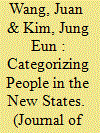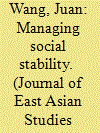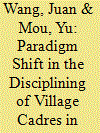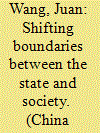|
|
|
Sort Order |
|
|
|
Items / Page
|
|
|
|
|
|
|
| Srl | Item |
| 1 |
ID:
191963


|
|
|
|
|
| Summary/Abstract |
What motivates states’ choice of social classification? Existing explanations highlight scientific beliefs of modern states or social engineering by ideological regimes. Focusing on the initial state-building period of two Communist regimes, China and North Korea, this article complements the existing literature and suggests that social classification reflects three missions of political leaders: regime distinction, governance, and power consolidation. Population categories are created to distinguish the new government from the old, to selectively provide welfare, and to attack political opponents. The varying weight of the missions and their manifestation in social classification depend on new ruling elites’ cohesion and past experiences. This comparative historical analysis sheds light on the rise of political chaos in China and the personalistic dictatorship in North Korea in the 1970s.
|
|
|
|
|
|
|
|
|
|
|
|
|
|
|
|
| 2 |
ID:
137205


|
|
|
|
|
| Summary/Abstract |
Based on a town government's meeting memos between March 2001 and October 2007, annual work reports, and my interviews with local officials, I show that China's township governments have strived to contain, rather than resolve, social discontent. The tendency toward containment lies in two fundamental features of China's political institutions and central government strategy. First, in order to optimize the function of the petition system as a source of information without losing control, the Hu Jintao administration (2002–2012) passed regulations protecting the rights of petitioners on the one hand, and simultaneously put pressure on local officials to discourage petitioning, on the other. Second, the technical, institutional, and political features of China's cadre evaluation system encouraged local officials to take a short-term perspective on challenges, avoiding penalties rather than actually solving problems.
|
|
|
|
|
|
|
|
|
|
|
|
|
|
|
|
| 3 |
ID:
181931


|
|
|
|
|
| Summary/Abstract |
Village cadres are important agents for the state yet disciplining them has been difficult. There are few disciplinary tools that can easily hold them to account. Prior to 2018, Party discipline did not apply to non-Party cadres. Legislation was ambiguous in relation to these grassroots agents and had to rely heavily on legal interpretation. The impact of the cadre evaluation system on village cadres, who are not considered to be public servants on the state payroll, was limited. This situation has changed since 2018. The party-state has consolidated and institutionalized ways in which grassroots cadres are checked and disciplined. Instead of relying on policy regulation, which had been the dominant disciplinary method since 1949, village cadres are now fully subject to Party rules and state laws. These changes have been accomplished through the application of three measures. First, village Party secretaries are to serve concurrently as village heads, and members of village and Party committees are to overlap, thereby making them subject to Party discipline. Second, village cadres are now considered to be “public agents” and are on an equal legal footing with other state agents. Finally, a campaign waged by the criminal justice apparatus cleaned up village administration and prepared it for upcoming village elections in a new era.
|
|
|
|
|
|
|
|
|
|
|
|
|
|
|
|
| 4 |
ID:
119183


|
|
|
|
|
| Publication |
2012.
|
| Summary/Abstract |
Despite the central government's efforts in reducing fiscal burdens on peasants through fiscal reforms in the early 2000s, collective petitions in rural China remain. Complementary to the arbitrary and weak government explanations of state-society conflict, this article reveals the role of village cadres as activists in collective petition. Drawn from extensive fieldwork, I argue that by reducing local government revenues and recentralizing fiscal autonomy to the county level, central fiscal reforms have unintentionally induced a new force of resistance: village cadres. Being disenfranchised from previous privileges, village cadres are now allies rather than adversaries of peasant petitions. This article advances existing literature on China's contentious politics in two ways. First, it recognizes a new group of activists whose savoir-faire improves peasant knowledge of the state capacity in containing state-society conflict. Second, it proposes a dynamic understanding of contentious politics by highlighting the shifting boundaries between the state and society.
|
|
|
|
|
|
|
|
|
|
|
|
|
|
|
|
|
|
|
|
|